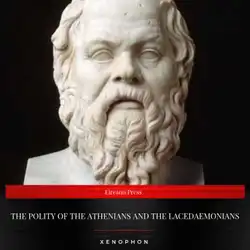In "The Symposium," Xenophon presents a fascinating exploration of love, companionship, and social discourse through a series of lively conversations amongst notable figures of ancient Athens. Written in the tradition of Socratic dialogues, this work employs a straightforward yet engaging style, allowing readers a transparent glimpse into the philosophical views prevailing in the 4th century BCE. The text serves not only as a literary artifact but also as a vital commentary on the cultural and social dynamics of ancient Greek society, particularly regarding the complexities of human relationships and the nature of desire. Xenophon, an Athenian historian, soldier, and student of Socrates, was deeply influenced by his philosophical training and his experiences in numerous military campaigns. His unique perspective as both a participant and observer granted him insight into the multifaceted nature of human interaction. In crafting "The Symposium," Xenophon aimed to preserve the intellectual legacy of his time while also reflecting on the moral and ethical dimensions of love and friendship. Readers seeking to grasp the intricate interplay of love and thought in ancient Greek culture will find "The Symposium" both enlightening and enjoyable. This text not only enriches one's understanding of classical philosophy but also resonates with contemporary discussions of love and human connection, making it a timeless addition to any literary collection.
The Symposium
Commencez votre essai gratuit de 14 jours
- Accès complet à des centaines de milliers de livres audio, d’e-books et de magazines dans notre bibliothèque
- Créez jusqu'à 4 profils — y compris des profils enfants
- Lisez et écoutez hors ligne
- Abonnements à partir de 9,99 € par mois

The Symposium
In "The Symposium," Xenophon presents a fascinating exploration of love, companionship, and social discourse through a series of lively conversations amongst notable figures of ancient Athens. Written in the tradition of Socratic dialogues, this work employs a straightforward yet engaging style, allowing readers a transparent glimpse into the philosophical views prevailing in the 4th century BCE. The text serves not only as a literary artifact but also as a vital commentary on the cultural and social dynamics of ancient Greek society, particularly regarding the complexities of human relationships and the nature of desire. Xenophon, an Athenian historian, soldier, and student of Socrates, was deeply influenced by his philosophical training and his experiences in numerous military campaigns. His unique perspective as both a participant and observer granted him insight into the multifaceted nature of human interaction. In crafting "The Symposium," Xenophon aimed to preserve the intellectual legacy of his time while also reflecting on the moral and ethical dimensions of love and friendship. Readers seeking to grasp the intricate interplay of love and thought in ancient Greek culture will find "The Symposium" both enlightening and enjoyable. This text not only enriches one's understanding of classical philosophy but also resonates with contemporary discussions of love and human connection, making it a timeless addition to any literary collection.

Symposium : A Banquet of Perspectives – Xenophon’s Dialogue on Eros, Friendship, and the Deeds of Socrates
Xenophon, Tim Zengerink
audiobook
Memorabilia : Remembering Socrates – Xenophon’s Portrait of Character, Conversation, and Everyday Philosophy
Xenophon, Tim Zengerink
audiobook
Oeconomicus : Household, Husbandry, and Leadership – Xenophon’s Lessons on Economics, Ethics, and Domestic Management
Xenophon, Tim Zengerink
audiobook
The Polity of the Athenians and the Lacedaemonians
Xenophon
audiobookbook
The Polity of the Athenians and the Lacedaemonians
Xenophon
audiobook
Stories from Xenophon—Excerpts
Xenophon
audiobook
Die Geschichte des Peloponnesischen Kriegs (Komplette Ausgabe: Buch 1&2) : Die Geschichte von Thukydides: 431-411 v.Chr. + Fortsetzung von Xenophon: 411-362
Thukydides, Xenophon
book
Hellenika : Die Geschichte des Peloponnesischen Krieges und seine Nachwirkungen
Xenophon
book
Die tapferen Zehntausend
Xenophon
book
50 Meisterwerke der Philosophie : Metaphysik, Das Gastmahl, Bhagavadgita, Tractatus logico-philosophicus, Kritik der reinen Vernunft, Also sprach Zarathustra, Selbstbetrachtungen von Marcus Aurelius
Ludwig Wittgenstein, Edmund Husserl, Karl Marx, Sören Kierkegaard, Friedrich Nietzsche, Ralph Waldo Emerson, John Stuart Mill, Georg Wilhelm Friedrich Hegel, Friedrich Schelling, Johann Gottlieb Fichte, Immanuel Kant, John Locke, Montesquieu, Jean-Jacques Rousseau, David Hume, Gottfried Wilhelm Leibniz, Baruch Spinoza, - Konfuzius, Lao Tse, Platon, Xenophon, - Aristoteles, Marcus Tullius Cicero, Seneca, Epiktet, Marc Aurel, Plotin, Thomas von Aquin, Nicolaus von Cues, - Erasmus von Rotterdam, Niccolò Machiavelli, Tommaso Campanella, Martin Luther, Giordano Bruno, Samuel von Pufendorf, Abbé Castel de Saint-Pierre, Michel de Montaigne, René Descartes, Francis Bacon, Blaise Pascal
book
Handbücher der Geschichte: Antikes Griechenland : Griechische Kulturgeschichte; Herodots "Historien"; Thukydides' "Geschichte des peloponnesischen Kriegs"; Xenophons "Anabasis"; Ilias und Odyssee
Johann Gustav Droysen, Jacob Burckhardt, Herodot, Thukydides, Xenophon, Ludwig Preller, Gustav Schwab, Homer, - Äsop, Platon, - Aristoteles, - Sophokles, Euripides, - Aristophanes, Alkiphron, Lukian, Aischylos
book
Die Geschichte des Antiken Griechenlands: Wesentliche Werke und Handbücher : Geschichte, Mythologie, Philosophie und Literaturklassiker
Herodot, Thukydides, Xenophon, Jacob Burckhardt, Johann Gustav Droysen, Ludwig Preller, Gustav Schwab, Homer, - Äsop, Platon, - Aristoteles, - Sophokles, Euripides, - Aristophanes, Alkiphron, Lukian, Aischylos
book